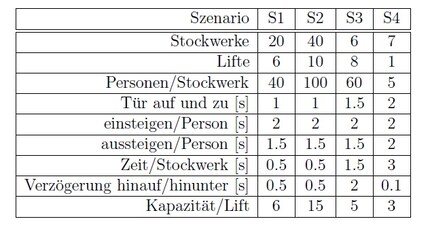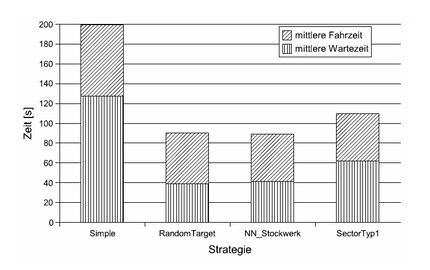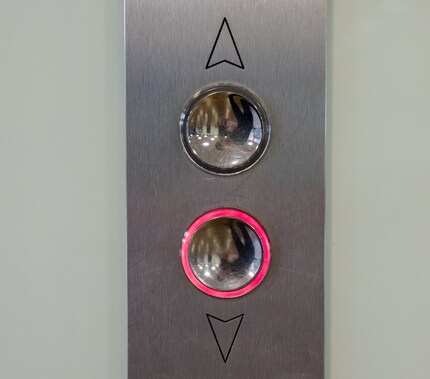
Guide
These plugs may be smart, but are they clever?
by Martin Jungfer

How does a lift system decide which lift stops at which floor? Or, in other words: why does the damned lift never arrive when I'm in a hurry? Let's take a look at the technology, which has always been a mystery to me.
Here I am again, waiting for the lift and asking myself why it's taking so long. Granted, someone could have blocked the door, but then the lift next door would have had to step into the breach. The lengthy wait started me wondering about how lift controls actually work. Is some artificial intelligence involved? Or is it more like artificial stupidity?
Of course, it could be that the lift doesn't take very long; it might just be me. After all, I haven't been standing in front of the doors with a stopwatch and compiling statistics on waiting times. There are multiple psychological reasons why the wait often feels longer than it really is:
Nevertheless, I'm sure I'm not imagining the waiting times. There must be technical reasons for them.
Programmers are well acquainted with what comes next: algorithms. An algorithm is a sequence of instructions. It tells the lift which system it should follow to carry out its tasks. For example, the algorithm could be: go up to the top floor and serve all guests that want to travel in this direction. Then go to the ground floor and do the same. Or: always go to the person who is on the nearest floor to you. Or: go to the person who has been waiting the longest.
It's clear that different algorithms are quicker in different situations. A complex algorithm could calculate the best transport plan for a given situation (there's a presentation on this by mathematician Jörg Rambau (in German)) in a reasonable timescale (less than a second). But the problem is that the situation is constantly changing. While the lift is serving a floor, it receives new tasks from people who have pressed a button inside or outside the door.
This is the biggest reason for unusually long waiting times every now and then. Even the best algorithm can't know what will happen next. For example, if you're standing in front of the door and a lift going in the right direction has just passed you, you're out of luck. The lift has already determined its route and won't turn around now. That would confuse or even annoy the people already in the lift.
So everyone will be the victim of an unfavourable situation now and then. You might therefore ask: which algorithm is the most efficient on average, i.e. in vastly different circumstances?
Three mathematicians at the University of Vienna conducted a study (in German) to examine exactly this. The following algorithms have been empirically tested:
The simulation was done on different scenarios: different buildings (numbers of floors, numbers of lifts with varying capacities and speeds) and different volumes of people. The mathematicians also considered peak times. In office buildings, everyone wants to go up from the main entrance in the morning, while everyone wants to come back down in the evening.

Unsurprisingly, the simple algorithm is the slowest. By a long way. However, I was surprised that the randomly-controlled mechanism is just as efficient as nearest neighbour. And it's actually better than the sector algorithm. The problem with sector allocation is that the lift passes people who are waiting when it could just have easily picked them up. This drawback is particularly problematic at peak times. And peak times are decisive, as all algorithms are more or less satisfactory with low volumes of people.

The lift which travels to the person who has been waiting the longest is the fairest, but not the most efficient. It also potentially prevents extremely long waiting times, even though it's worse overall. Unfortunately, the study's authors don't have any data on that.
The paper doesn't make it clear which principle the waiting people's calls follow. There are systems with just one button («I need the lift»), those with two buttons («I want to go up/down») and even some where you can choose the floor in the process.

Two buttons enable all algorithms to work more efficiently than one because lifts only stop when they're already travelling in the right direction. However, two-button controls can result in losses in efficiency of up to 30% (in German) if someone accidentally presses the wrong button. Logically, this can't happen with one-button controls.
If you can choose your floor, the system knows from the start which people are heading to the same destination. This information is used to minimise intermediate stops. This means reducing the journey time rather than waiting times. This is especially practical in high-rise buildings. Although this can increase waiting times, conveying capacity can be increased by 15–20%.
By the way: if the lift is voice-operated and never arrives, it's because the person is speaking in a Scottish accent, as the video below shows.
What I didn't find out was which algorithms are actually used where. What is clear is that there are very different lift systems based on their age and requirements. Self-learning systems are also being used now. They constantly monitor the number of people on different floors and their destinations and adapt based on this information. Critical peak times can therefore be managed more successfully.
So now there's just the final unanswered question on lift controls to address. Does the «close doors» button actually work, or is it just a placebo that's only there to keep you occupied while you're waiting? My theory? Lift manufacturers keep the answer a secret so that we shorten the waiting time ourselves by talking about it.
My interest in IT and writing landed me in tech journalism early on (2000). I want to know how we can use technology without being used. Outside of the office, I’m a keen musician who makes up for lacking talent with excessive enthusiasm.
Practical solutions for everyday problems with technology, household hacks and much more.
Show all